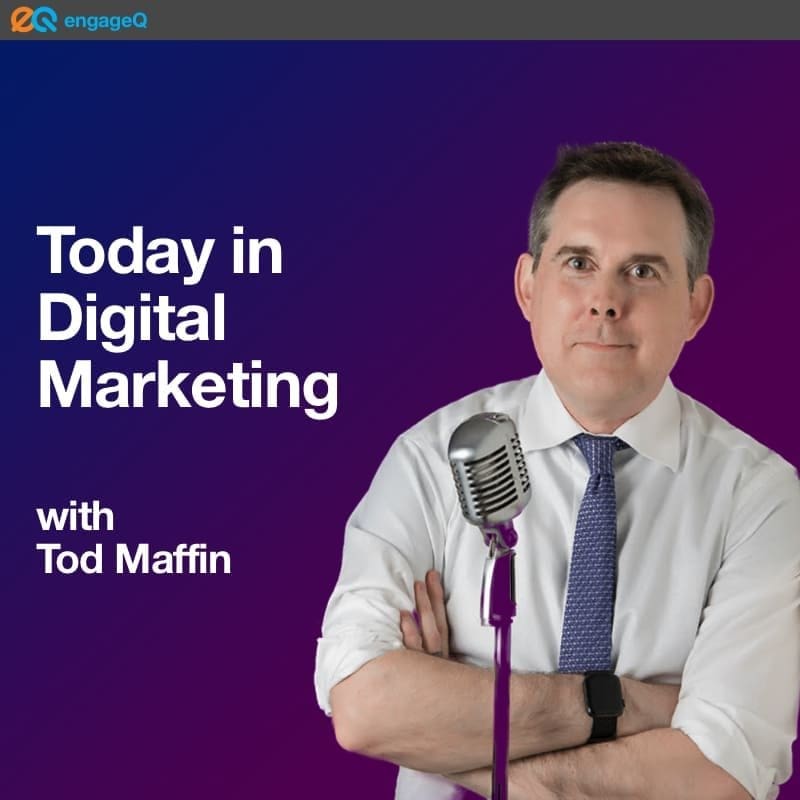Follow us: Mastodon, TikTok, Threads, Instagram • more
Follow Tod: Mastodon, LinkedIn, TikTok, Pixelfed • more
Listen to this newsletter as a podcast 🎧 Subscribe Free
Get your business discovered on TikTok!
Maximize ROI by reaching your most relevant audience
Reach new audiences in 20+ markets worldwide
Fast setup for every level of expertise
Flexible budget that works for businesses of all sizes
UPGRADE TO PREMIUM and get instant access to:
✅ Exclusive Google and Meta updates
✅ no ads at the top of the newsletter
✅ 20+ marketing science interviews
✅ live industry events
✅ our premium Slack channel
✅ regular livestreams with Tod
✅ 30% off our Premium podcast for life
✅ big discounts on marketing tools
In This Issue:
🔍 U.S. Government targets Google over “monopolistic” practices
🛍️ TikTok introduces in-app shopping feature for US users
🔗 LinkedIn unveils branded content library for influencer campaigns
📦 Amazon launches “Supply Chain by Amazon” for broader logistics
🚫 Meta's Threads restricts searches about COVID-19 and politics
❤️ Instagram experiments with hiding user like activity
🎥 YouTube tests vertical live stream presentation format
⚠️ Chrome addresses critical vulnerability exploited in the wild
What the Google vs U.S. Government Case Means for Marketers
It’s here. The giant anti-trust case of the U.S. Government vs. Google.
We do not plan to cover the day-by-day minutia of the case, and — in fact will mostly ignore it from this day on until a verdict comes down.
But you might be hearing a lot about it from other sources, so we thought a primer on what it’s all about might be helpful.
Who’s suing and why?
The American Department of Justice, along with some states, is suing Google for what they say are violations of the Sherman Act, a U.S. Federal law prohibiting monopolistic business practices. [full lawsuit PDF]
In short, they say Google is “a monopoly gatekeeper for the internet” and uses anti-competitive tactics to corner the market on Internet searches and, by extension, the advertising business therein.
Specifically, prosecutors point to deals Google’s made with phone manufacturers to be the exclusive search engine on those phones — notably, Apple, which Google pays billions each year to remain as the default search on Safari.
But in the end, this is about money — ads, that is, and the case is expected to focus on not just organic search but also:
Keyword-based text ads served beside organic search results
General display ads served on the top of organic search results
For its part, Google is likely to say that competition is easy to access — just go to their competitors web sites.
As for paying to be the default search engine on phones, they’re expected to liken the practice to cereal makers paying supermarket chains to put their products at eye-level. (This is, of course, a little rich — I mean, have you seen the cereal aisle lately? It’s not like Raisin Bran takes up 90% of the shelving.)
I should note that there is a separate federal antitrust case alleging that Google’s ad tech stack is also in violation of the Sherman Act, but that case won’t start up until next year.
Why is this such a big deal?
Google made $163 billion off search ads last year — more than half of its parent company’s total annual revenue.
Historically, probably the closest comparison would be when Microsoft lost its anti-trust case in 1999. Back then, it was about web browsers. Netscape had been the dominant player, until Microsoft made Internet Explorer the default on its operating system, and cut exclusive deals with computer manufacturers for it to be the default on their hardware too.
The decision had massive impact. The tech industry had been riding a bubble. It was easy to get financing if you were in the web space. (I know, because I had one. I founded a dot com around that time, raised $3 million, and when the Microsoft decision came down, no funders wanted anything to do with us or the industry as a whole.)
What impact does this have on digital marketing?
Potentially, a lot.
In its latest annual report, Google warned that aggressive enforcement of competition laws could “increase our cost of doing business, make our products and services less useful, limit our ability to pursue certain business models” in a manner that could have “an adverse effect on our business.”
The downstream impact is potentially infinite.
Consider any professional whose marketing activity (both organic and paid-for) employs the use of keywords for search engine optimization, plus any website-owner that uses Google as their default search browser in their toolbar.
The slightest alteration to how Google operates will have a widely-felt ripple effect given that its share of the search engine market is in-and-around 90 percent.
Combine this with the fact that optimizing for/bidding on keywords to improve placement in search engine results is the core component of performance marketing, and it’s clear: the future of the marketing profession/practice hinges upon the outcome of this trial.
Digiday.com
How bad could it get for Google?
Google could be broken up.
The Sherman Act allows for the dismantlement of monopolies. The prosecutors haven’t yet said what recourse they’d want if they win.
It could also just end up in a bunch of fines — Google’s paid billions in various fines prior to this.
Or, of course, Google might win and consider that as approval to extend their business.
What’s the timeline?
The court case kicked off today; proceedings are expected to run into January at the least. But if previous cases are anything to go by, this will likely be years before there’s anything conclusive.
However, that’s no excuse for complacency, as prosecutors are keen to point out, this is a battle over the future of the internet and its environment for doing business for the decade to come.
Digiday
This Week’s Changes to Meta Ad Platform [✨ Premium Exclusive]
Every Tuesday, exclusively in the Premium Newsletter, our Meta ads correspondent Andrew Foxwell walks us through the latest platform changes. (Andrew runs the Foxwell Founders community of digital ad buyers and offers training in the digital ad space.)
This week:
Individual ad scheduling for ASCs
Conversions API setup got simpler
Update on use of link stickers in paid Stories
Archived Instagram posts and Partnership Ads
🔐 This column is a Premium Exclusive. Upgrade today!
TikTok Finally Releases its In-App Shop; No Details on Fee Charged to Merchants
So while Google starts the day being sued, TikTok started the day off with the launch of its long-awaited in-app Shop.
After more than a year of testing, TikTok Shop launched in the U.S. today.
Users will start to see Shop at the top of the app, and in-feed videos will point people to products in the Shop. The purchase will happen right inside the app, using Apple Pay, PayPal or a credit card.
But not for free.
TikTok will take a cut, eventually. How much? For now, they won’t say.
An executive told the New York Times that it was “focused on getting the first of all the sellers to add their inventory to the platform.”
Obviously, the company is trying to get ahead of any concerns with American lawmakers around how much access the Chinese government might have to American consumers data — TikTok said all user data will be stored and managed in the U.S.
Merchants will not be allowed to sell adult products, alcohol, or tobacco — and even some types of baby and maternity products will be off-limits.
The company says it’s already signed up 200,000 sellers to TikTok Shop.
As of right now, about 40% of the U.S. user base has access to the new Shop, and the rollout continues.
If You Like “Today in Digital Marketing”…
SPONSORED I try to keep my email inbox as clear as I can, but one of the few email newsletters I let in is Marketing Brew.
It gives me a solid headstart on the day’s marketing news, and helps me understand what’s trending that I should share with you here.
There's a reason more 4 million people start their day with Morning Brew – the daily email that delivers the latest digital marketing and business news.
Business news doesn't have to be boring…make your mornings more enjoyable, for free. [learn more at morningbrew.com]
LinkedIn Now Lets You Search B2B Influencer Campaigns
Ever wondered what your competitors are up to with influencers?
B2C marketers have had ad libraries to peek in on branded content partnerships. They could go to a platform, like Meta, search for a brand, and see what ads they were running.
Until now, B2B influencer campaigns were still a little off the radar.
But not for long.
LinkedIn this week is rolling out an ads library for branded content partnerships. This will let you find all campaigns that have used the new branded content tags it released last month.
Like many of these new ad transparency features coming out, this is less about altruism and more about legislation.
These kinds of databases are now requirements under the new EU Digital Services Act (DSA).
Meta and TikTok have already released their versions of branded partnership libraries.
LinkedIn recently reported that sharing of original content on the platform increased by 41% last year, compared to 2021.
At those levels, you can expect that a lot more creators will be looking LinkedIn’s way, and as X continues to transform its offering, it may well be LinkedIn that benefits the most from a re-routing of business-related discussion.
The right influencer, in the right niche, could be highly valuable in this context, and this could end up being a key tool to boost your efforts.
SocialMediaToday.com
Read more at socialmediatoday.com
Amazon Will Take Over Your Entire Distribution Chain (If You Let It)
Amazon this morning announced it will soon let its merchants deliver to more places than their customers’ doorsteps — specifically, to stores and warehouses.
It’s a new program they’re calling Multi-Channel Distribution (MCD). And it will let sellers restock all their fulfillment channels from a single inventory pool. Sellers in the program will be able to get Amazon to pick their products up right at the manufacturer’s location, handling customs, and ground transportation.
The program is currently in testing with a small group of sellers.
It also this week announced a broader set of supply chain services.
This, of course, builds on their wildly successful Fulfilled By Amazon program for merchants, which is 17 years old now, and lets sellers keep their inventory at an Amazon warehouse, letting Amazon handle the packaging and delivery.
In Brief
As COVID-19 cases increase around the world, Meta has decided to block COVID-related searches — or even just searches for the word “vaccine” on Threads. Users looking for information about the disease will see a blank page and a link to the Centers for Disease Control and Prevention. read more
Instagram is testing a feature that will let users hide their Like activity. This is different than hiding the number of likes your posts have received; rather, this would hide which posts your account has liked in the past. read more
YouTube is testing out full-screen viewing for vertical live streams. The company, of course, playing catch-up with TikTok’s livestreaming. The two interfaces look almost identical. read more
Google has released a critical update for its Chrome browser, fixing a vulnerability related to the graphics format WebP. This is not a theoretical exploit; it’s been seen in use in the wild. Users are advised to update their browser. read more
Do you manage a Shopify store?
Subscribe to The Early Checkout. News, tools, and strategies that work now to grow your Shopify store's brand & sales.
Some links in this newsletter may provide affiliate revenue to us.
This newsletter is powered by Beehiiv.














